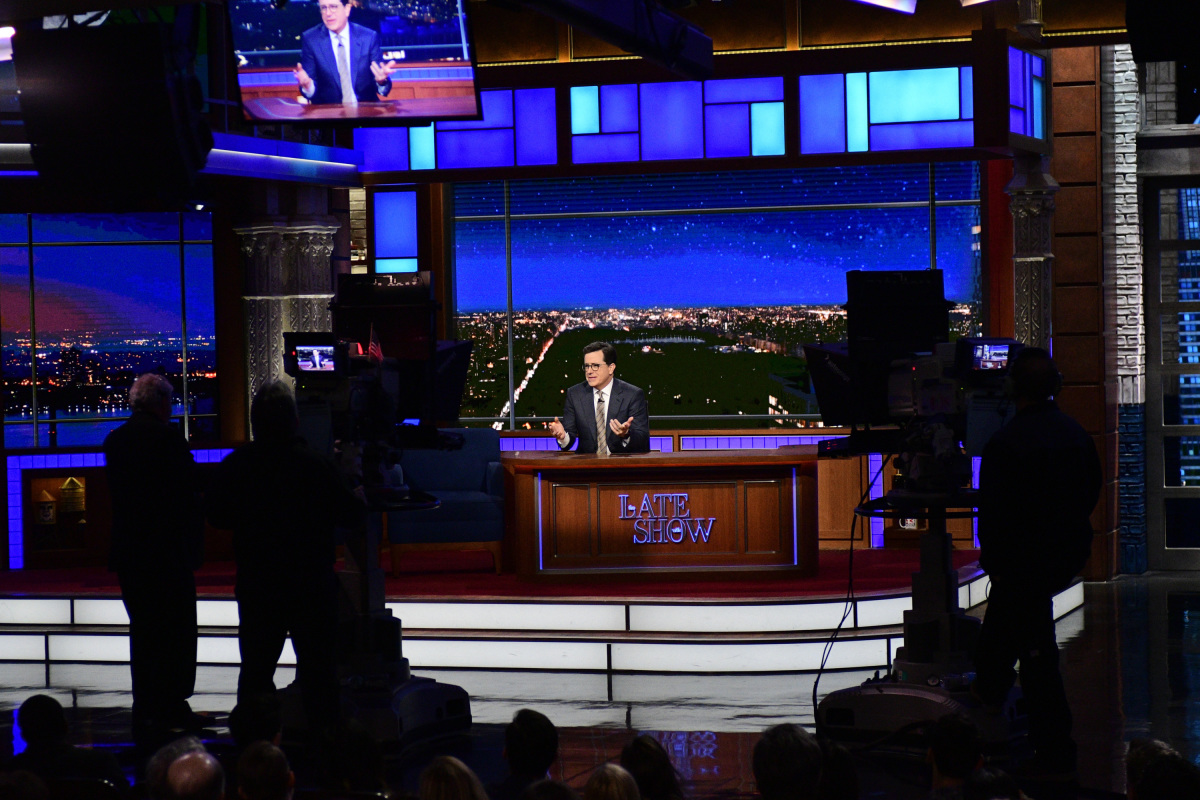Will Stephen Colbert lose his mojo when we inevitably get bored with Trump?
What's driving Colbert's ratings surge, and can he keep it up when America's premiere reality show becomes predictable?


America will get bored with President Trump.
Probably. Almost certainly.
As Trump approaches 100 days in office, there's little question his short tenure in the White House has been captivating and filled with drama. Whatever his faults, Trump has mastered the art of entertaining self-promotion, starting with making himself a tabloid staple in the 1980s.
The Week
Escape your echo chamber. Get the facts behind the news, plus analysis from multiple perspectives.

Sign up for The Week's Free Newsletters
From our morning news briefing to a weekly Good News Newsletter, get the best of The Week delivered directly to your inbox.
From our morning news briefing to a weekly Good News Newsletter, get the best of The Week delivered directly to your inbox.
He managed to keep his reality TV shows The Apprentice and The Celebrity Apprentice on the air for seven seasons apiece, which is no small feat. But the show's ratings trajectory, as The Washington Post's Philip Bump noted, was "like M. Night Shyamalan's: one surprise smash hit and, then, not so much." After a strong first season, Trump's ratings steadily declined.
Most presidents get honeymoon periods, but Trump mostly got a white-hot burst of almost unimaginable fame. He was everywhere, permeating just about every facet of news and pop culture. For a week in February, New York Times tech writer Farhad Manjoo tried to avoid any news having to do with Trump. "It is likely that no living person in history has ever been as famous as Mr. Trump is right now," he discovered. "The new president doesn't simply dominate national and political news. During my week of attempted Trump abstinence, I noticed something deeper: He has taken up semipermanent residence on every outlet of any kind, political or not."
That's just not sustainable. If The Celebrity Apprentice were on every night for 100 nights, with no editor or showrunner, and instead of firing a contestant, Trump could sit at the boardroom table and fire off globally consequential executive orders or even Tomahawk missiles, you might be terrified, but the amusement factor would wear thin pretty quickly.
The best antidote to fear and boredom is laughter, and that's where Stephen Colbert comes in. Colbert is on a tear, and he owes much of his recent success — 10 weeks in a row of beating Jimmy Fallon's Tonight Show in the ratings, after lagging badly for its first two years — to Trump. Colbert and his team say the turning point was election night, when Colbert hosted a live special on Showtime. "I think it's when he became himself," executive producer Chris Licht tells The New York Times. The first week Colbert's Late Show beat The Tonight Show was the week Trump was inaugurated.
A free daily email with the biggest news stories of the day – and the best features from TheWeek.com
"Blending pop psychology with Nielsen analysis is generally risky, and clearly not very scientific," says Josef Adalian at Vulture. But "Trump-related programming with a strong partisan edge is doing spectacularly well right now," and it seems clear Trump's presidency has been "a significant factor in pushing Colbert over the top in recent weeks."
For people transfixed and scared of the direction Trump is taking the country and the world, Colbert's monologue jokes and short cold-open sketches provide some sharp-edged deflationist levity mixed with shards of actual news, a bit of light in the engrossing darkness. But what will happen to Colbert's audience when the bright flame of Trump's fame dims and he becomes a predictably idiosyncratic politician?
"The biggest question in late night is, of course, how long Colbert can keep beating Fallon," says Adalian. "The same hyperfocus on Trump and politics that helped Late Show leap ahead could turn to Trump fatigue if audiences simply grow sick of hearing about the president's misadventures. (There's also the chance Trump could suddenly become boring, but ... yeah, no, that's not going to happen.)"
It could certainly happen that we tire of the Trump Show. Americans couldn't read or watch enough about Sarah Palin, for example, until they didn't care anymore. Barack Obama was the biggest star in the political firmament until he hunkered down to the hair-graying grind of governing and compromising. Sen. Bernie Sanders (I-Vt.) is still popular with his supporters and a regular fixture on TV, but he will likely never again reach the glorious height of having a bird land on his lectern at a Portland rally.
Stars fade. Familiarity breeds, if not contempt — that ship has sailed for many Trump-weary Americans — then boredom.
Even so, Colbert might be okay. The groundwork for his Late Show success started just after the 2016 Super Bowl, when a poorly rated live show led CBS to move Licht from CBS This Morning to Colbert's show, allowing the host to give up his iron grip on the minutia of running a show and focus on being funny. And even if people start to find Trump's antics tiresome, comedy has a way of adapting — Colbert's Comedy Central show and the program it grew out of, The Daily Show, thrived off George W. Bush's presidency even as Bush flailed and became an early lame duck in his final years.
The bigger threat to Colbert's winning streak in the ratings may be less about Trump and more about Fallon, who still has a lock on the younger demographic that advertisers yearn to reach. Fallon has been losing viewers more than Colbert has been gaining them, but he is in the middle of a staff shakeup, with long-time head writer A.D. Miles leaving the show. Fallon is immensely talented, but he appears to have hit a rut, maybe a little bored with his own games and celebrity fawning. He is reportedly being pressured to become more political, but he isn't really a political comedian.
Right now, "people want to see social commentary at the end of the night," CBS head Leslie Moonves told a Deutsche Bank Media and Telecom Conference in March. "They don't want to see fun and games." Fallon's fans don't go to him "for political acumen," Colbert told The New York Times. "They go there for fun. They go there for his nature, his spirit."
If America embraces fun and levity again over hard-elbowed political comedy — if Trump allows everyone the luxury of boredom again — then Colbert might be happy to move on to other subjects.
And even if Colbert sinks back to No. 2 in the late-night war, well, his predecessor, David Letterman, did just fine in the runner-up slot for about two decades, and Colbert's show was profitable for CBS when he was far behind Fallon in the ratings. As long as Colbert stays amusing, Trump's entertainment value won't steer his fate.
Peter has worked as a news and culture writer and editor at The Week since the site's launch in 2008. He covers politics, world affairs, religion and cultural currents. His journalism career began as a copy editor at a financial newswire and has included editorial positions at The New York Times Magazine, Facts on File, and Oregon State University.
-
 Why is Trump’s alleged strike on Venezuela shrouded in so much secrecy?
Why is Trump’s alleged strike on Venezuela shrouded in so much secrecy?TODAY'S BIG QUESTION Trump’s comments have raised more questions than answers about what his administration is doing in the Southern Hemisphere
-
 Vance’s ‘next move will reveal whether the conservative movement can move past Trump’
Vance’s ‘next move will reveal whether the conservative movement can move past Trump’Instant Opinion Opinion, comment and editorials of the day
-
 Why recognizing Somaliland is so risky for Israel
Why recognizing Somaliland is so risky for IsraelTHE EXPLAINER By wading into one of North Africa’s most fraught political schisms, the Netanyahu government risks further international isolation
-
 Bari Weiss’ ‘60 Minutes’ scandal is about more than one report
Bari Weiss’ ‘60 Minutes’ scandal is about more than one reportIN THE SPOTLIGHT By blocking an approved segment on a controversial prison holding US deportees in El Salvador, the editor-in-chief of CBS News has become the main story
-
 Has Zohran Mamdani shown the Democrats how to win again?
Has Zohran Mamdani shown the Democrats how to win again?Today’s Big Question New York City mayoral election touted as victory for left-wing populists but moderate centrist wins elsewhere present more complex path for Democratic Party
-
 Millions turn out for anti-Trump ‘No Kings’ rallies
Millions turn out for anti-Trump ‘No Kings’ ralliesSpeed Read An estimated 7 million people participated, 2 million more than at the first ‘No Kings’ protest in June
-
 Ghislaine Maxwell: angling for a Trump pardon
Ghislaine Maxwell: angling for a Trump pardonTalking Point Convicted sex trafficker's testimony could shed new light on president's links to Jeffrey Epstein
-
 The last words and final moments of 40 presidents
The last words and final moments of 40 presidentsThe Explainer Some are eloquent quotes worthy of the holders of the highest office in the nation, and others... aren't
-
 The JFK files: the truth at last?
The JFK files: the truth at last?In The Spotlight More than 64,000 previously classified documents relating the 1963 assassination of John F. Kennedy have been released by the Trump administration
-
 'Seriously, not literally': how should the world take Donald Trump?
'Seriously, not literally': how should the world take Donald Trump?Today's big question White House rhetoric and reality look likely to become increasingly blurred
-
 Will Trump's 'madman' strategy pay off?
Will Trump's 'madman' strategy pay off?Today's Big Question Incoming US president likes to seem unpredictable but, this time round, world leaders could be wise to his playbook
